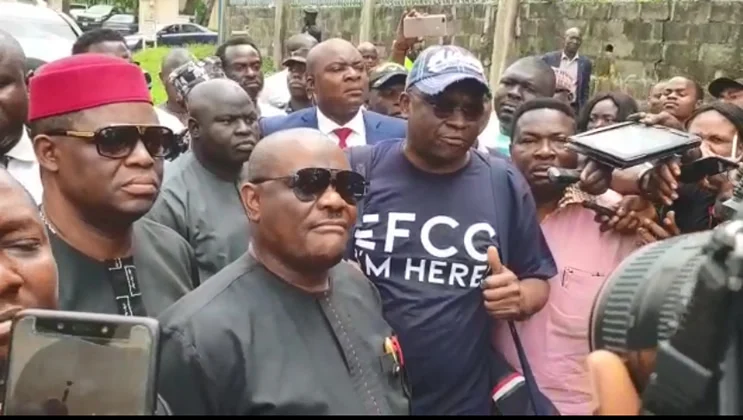
FEDERAL HIGH COURT RESERVES RULING ON FAYOSE’S NO-CASE SUBMISSION IN N6.9BN MONEY LAUNDERING TRIAL
By Aishat Momoh. O.
The Federal High Court in Lagos has reserved its ruling on the no-case submission filed by former Ekiti State Governor, Ayodele Fayose, in his ongoing trial over alleged money laundering and theft involving ₦6.9 billion.
Justice Chukwujekwu Aneke reserved judgment after hearing final arguments from the legal teams of Fayose, his co-defendant company Spotless Investment Limited, and the Economic and Financial Crimes Commission (EFCC).
Fayose and Spotless Investment were re-arraigned on an 11-count charge filed by the EFCC, bordering on money laundering, conspiracy, and theft. The charges stem from alleged offences committed during Fayose’s tenure as governor and linked to funds allegedly diverted from the office of the former National Security Adviser (NSA).
Lead counsel to Fayose, Chief Kanu Agabi, SAN, while adopting the no-case submission dated July 16, 2025, argued that the EFCC failed to establish a prima facie case against the former governor. He pointed out that Abiodun Agbele, who allegedly played a central role in the transactions, was not charged alongside Fayose, weakening the credibility of the prosecution’s case.
“With due respect, the predicate offences on which these charges are based do not hold water. Criminal breach of trust and conspiracy are distinct, and no co-conspirator was charged alongside the defendant,” Agabi stated, urging the court to find that Fayose has no case to answer.
Similarly, Olalekan Ojo, SAN, counsel for Spotless Investment Limited, adopted a no-case submission dated March 21, 2025. He questioned the reliability of the EFCC’s evidence, particularly the testimony of its 13th witness, former Minister of State for Defence, Senator Musiliu Obanikoro, who admitted there was no direct communication between Fayose and the then NSA, Col. Sambo Dasuki (rtd).
In response, EFCC counsel Rotimi Jacobs, SAN, argued that the no-case submissions lacked merit and should be dismissed. Adopting the Commission’s counter-affidavit and written address dated May 8, 2025, Jacobs contended that Fayose failed to explain a series of suspicious transactions.
“If the money was clean, why not buy the properties in his name?” Jacobs asked, referencing the testimony of an EFCC investigator who said Fayose used associates to purchase properties in Abuja, Lagos, and overseas—individuals who later denied ownership, while Fayose allegedly claimed the assets in his statement.
Jacobs also cited Obanikoro’s testimony that Fayose personally requested cash and introduced Agbele to facilitate the handover of $5 million, stressing that such conduct warrants explanation in court.
At the end of proceedings, Chief Agabi successfully sought the court’s permission for Fayose to travel abroad for medical treatment.
Justice Aneke subsequently adjourned the case to July 10, 2025, for ruling on the no-case submission.
Fayose was initially arraigned in 2018 before Justice Mojisola Olatoregun, but the case was later reassigned to Justice Aneke at the request of the EFCC.
According to the EFCC, Fayose allegedly received ₦1.2 billion from the NSA’s office to fund his 2014 gubernatorial campaign and took delivery of $5 million in cash through Obanikoro. He is further accused of laundering funds by acquiring properties via fronts and shell companies, including De Privateer Ltd and Still Earth Ltd, in contravention of the Money Laundering (Prohibition) Act, 2011.
